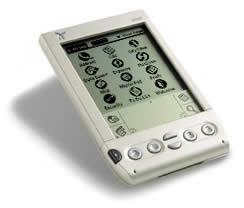 |
|
|
|
Then I started playing with it. Looking up meds in Tarascon was lighting fast, and I could flip over to Epocrates to see if there was any more info (occasionally, but not often). On my old Deluxe, MedRules usually takes about 8 seconds just to start, and another 3-4 for the actual rules to show up after I get past the disclaimer. On the Pro, it took less than 3 to load, and I couldn't measure the lag for the rules to show up. That's right, the thing is fast. It seems to handle both complex calculations and large data files faster. Of course, I only have my Deluxe to compare to. It seems about as fast as my father's Platinum (the few times I've gotten to play with it.) The Pro also comes with some neat software upgrades
that only Handspring has. First, it comes loaded with Palm OS 3.5.
Not the newest OS (Palm is up to 4 something now), but as I said,
it has a few tweaks. One is a silent alarm option. Because the Pro
uses an internal lithium ion rechargeable battery, it has a little
LED below the power button to let you know when the unit is charging.
Handspring made use of that LED to serve as a silent alarm as well.
You can change options from within Date Book Plus, allowing you
to choose audible alarms, or a flashing light from 1-15 minutes.
I tend to carry my handheld in an eHolster,
so a little blinky light wouldn't help me, but if I did a lot of
time in meetings and I didn't want the thing bleeping at me, a silent
alarm would be nice. The rechargeable battery is similar to the one in the Visor Prism. Handspring's specs say you should get 4-6 weeks of power out of one full charge, and you get a partial recharge every time you sync. If like (like me) you tend to put your Visor on the cradle as soon as you walk in the door to your office, you should never run out of juice. I seem to remember Handspring saying that you can get a top-up charge in as little as 15 minutes, so if you hit the sync button while checking your messages, and leave it on the cradle while you answer those messages, then you should get close to a full charge every day. Now for a few things I didn't like. Not much really. I still don't like the silver paint that both the Platinum and the Pro use. Unless you are totally anal about protecting it, it rubs off the corners and scratches, leaving you with a pretty battered looking handheld in a short time. I'm also still kind of ambivalent about the rechargeable battery. I know that LiIon batteries don't have the memory effect problem that NiCds did, but there is still a limit to the number of times a rechargeable battery can be recharged. If the battery dies, it will take a trip to Handspring to have it replaced. Most of you think that you will have upgraded to a new handheld by then, but I want to point out that there are still people using Palm III's or even the original Palm Pilot out there, running on their trusty AAA's. My Palm III runs just fine, even though it is now almost 4 years old, as does my Visor Deluxe at 1 and a half. Anyway, the Platinum and the Deluxe have both been retired, replaced by the Pro and the Neo (respectively). Both have 33 MHz processors, but as I said at the beginning, the Pro has 16 meg of memory. It's kind of like having a pocket that is twice as a big as you expected. I give the Pro 95 out of 100 - a fast beat that gives 200%. Check current pricing at the PDA cortex Store Keith can be reached by email
|
|||||||||


